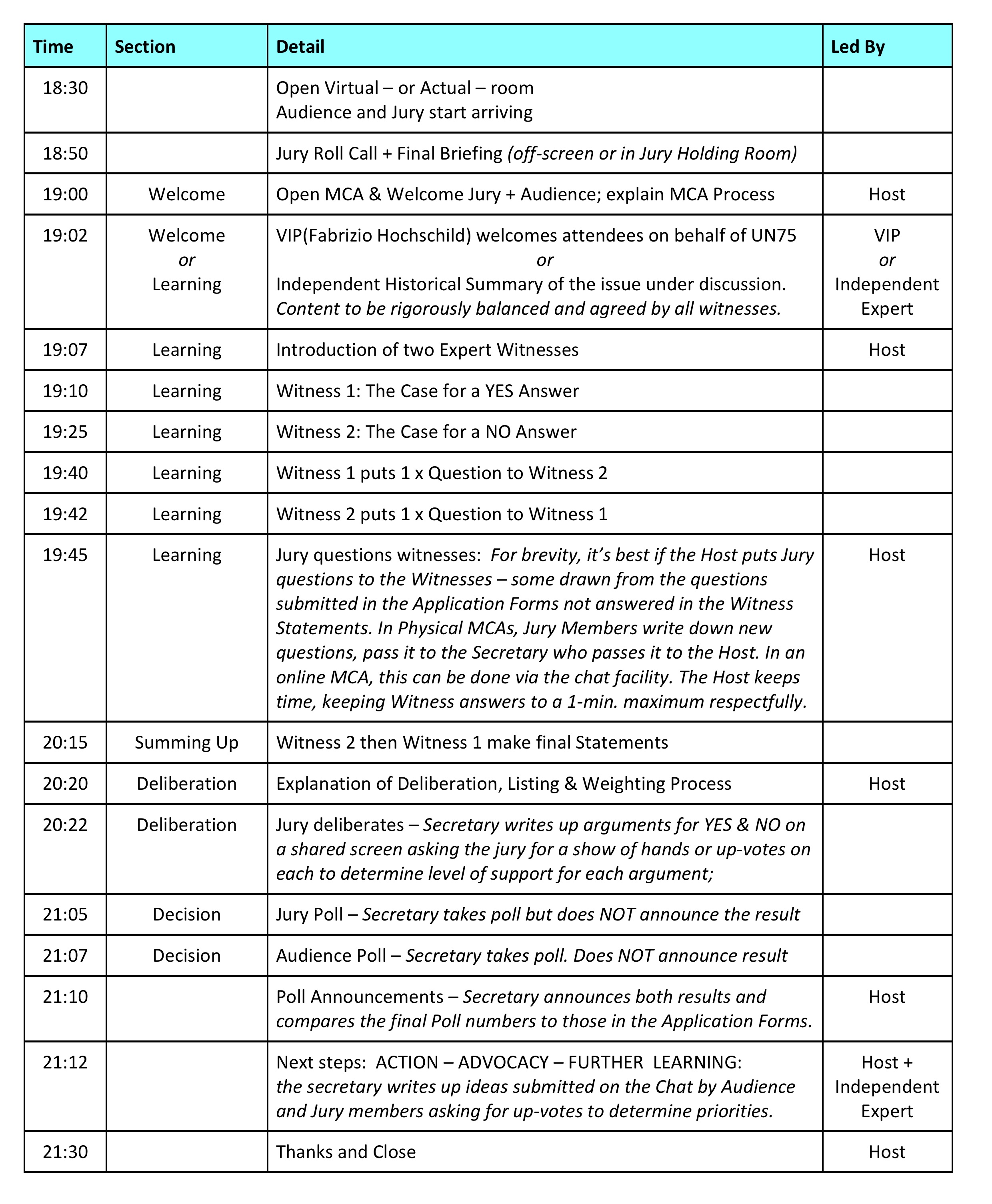How to Run Your MCA?
Here’s a Sample Agenda for a two and a half hour MCA which can be used for any topic

ONLINE / PHYSICAL
In Planning Your MCA, the first decision you have to make is whether to have it online or physical (face-to-face). There are advantages to both approaches and it may be possible to use a combination of the two. You decide. For us – developing this website in the time of Coronavirus, an online version is the only one possible, so we explore the Step-by-Step approach to that first:
Step ONE: Choose Your Platform, Date and your online management system: (Section to be completed)
Step TWO: Recruit Your Jury & Audience:
Step THREE: Create a Technical Schedule for your MCA (Section to be completed)
Step FOUR: Send round a follow-up email to all participants – identifying agreed Next Steps;
For a Physical MCA, the steps are pretty much the same, with differences as follows:
Step ONE: Choose Your Location, Date and your online management system: (Section to be completed)
Step TWO: Recruit Your Jury & Audience:
Step THREE: Plan a precise movement order for your entire event. We suggest the following:
Step FOUR: Send round a follow-up email to all participants – identifying agreed Next Steps;
We recommend that, for both approaches, you should use a TRELLO management system board, and store all the data / information on Google Docs. (Feel free to copy information and links from this website.)
MANAGING THE AGENDA
The following elements of the MCA agenda should be handled thus:
Agreed Historical Summary: it’s vital for ALL witnesses from all sides of the Assembly topic agree this. Everyone – Witnesses, Host & Secretary, Audience & Jury – must start from the same basic knowledge;
Witness Statements: Each witness – or team of witnesses – must be allowed 15-20 minutes uninterrupted time to present their arguments. This can be done with or without powerpoint.
Questioning the Witnesses: For speed and brevity, we suggest the host put all questions to the Witnesses. Though possible in both online and physical MCAs to have jury members ask their own questions, the questioners may give speeches – grand-standing their views. Though fine in day- or week-long Citizens’ Assemblies, this costs precious time. To avoid this, start by inviting Jury and Audience members to ask ONE question in their application form. Send these to the Witnesses so that they can answer some of them in their statements. Also create a digest of them for the Host – so that s/he can ask the first questions from this digest / pre-Assembly list that the Witnesses have failed to answer. There-after, stewards and/or the Secretary, can gather written questions from the Jury in a Physical Assembly. Or, in an online Assembly, gather questions on the chat facility and get the jury/audience to ‘up-vote’ the questions they are most interested in. The host can then put all new questions to the Witnesses.
Deliberation – Listing – Weighting: Deliberation in a Jury Room involves jury members working to reach consensus. There is no formal, agreed process. You can do that with an MCA: run a completely unstructured, random exchange of views – leaving the jury members to move towards consensus, argue and wax polemical as they wish. Or you can be surgically methodical:
- Write up a LIST of the arguments / Points that the Jury, and audience, remember from each Witness. Make Separate columns FOR – AGAINST – OTHER;
- Then WEIGHT each point / argument by assessing the support for each in the Jury / Audience;
- Do this Online by up-voting each on the Chat;
- Do this at a Physical MCA by asking for a show of hands on each point;
- ADD UP the points given to each argument;
Though in no way is this supposed to replace the conscience of individual jury members, it will help them assess which arguments carry the most weight amongst their community and peers;
Next Steps: Use the same method of gathering written ideas for Action, on the chat or on paper, and the same up-voting / show of hands system to agree priorities for next steps. As organisers, we would always encourage individuals who have enjoyed the MCA process to spread the word: offer one obvious Next Step which is to plan and host an MCA on a chosen topic that is important to your community. Give out the URL of this website for this purpose.

